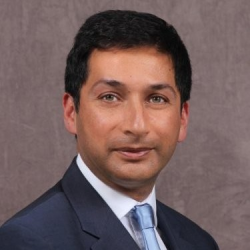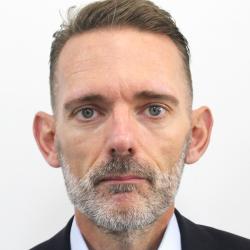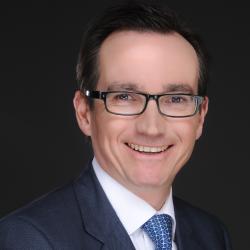Agenda
Agenda

Risk Live Europe agenda
The Risk Live Europe agenda showcases world-class speakers and industry leaders sharing critical insights on the trends affecting the market this year
Plenary sessions
08:00 – 08:45
Registration and refreshments
08:00 - 09:00
08:45 – 09:10
Welcome to Risk Live Europe 2024
09:00 - 09:10
Duncan Wood is the London-based editor-in-chief of Risk.net. He was promoted to the role at the start of 2015, to lead the editorial reorganisation of the website and its print titles. Wood had been editor of Risk magazine since July 2011. He rejoined Risk as European editor in October 2009, having originally worked for Risk and Asia Risk in London and Hong Kong as a writer and researcher between 1998 and 2000.
In the intervening years, Wood was news editor for the Oliver Wyman-founded online start-up ERisk.com. He also worked freelance for six years while living in Germany, with his work featuring in Euromoney, Financial News, IFR, and The Wall Street Journal, as well as Risk magazine and its sister titles. Wood has written about derivatives and risk throughout his 17-year career in journalism. He is a Neal Awards finalist, and has won Incisive Media's journalist and editor of the year awards.
09:10 – 09:35
Opening keynote: Rory Stewart, Former Secretary of State, UK Government
Keynote address
09:10 - 09:30
Today’s geopolitical picture is complex. This opening keynote aims to demystify the current impact of global political trends, as well as looking at what might happen in the next decade and beyond. With the interconnected nature of these risks, and their impact on markets worldwide, the financial services industry needs to be prepared for potential fall out, but also is well placed to collaborate and co-ordinate efforts which might mitigate some of these risks and promote sustainable economic growth.
Rory Stewart is a diplomat, author, explorer, academic, and politician – serving in successive Conservative governments as minister of state for international development, minister for environment, minister of state for Africa, and minister of state for prisons. He is a senior fellow at Yale University’s Jackson Institute for Global Affairs, where he teaches politics and international relations.
Stewart is an acclaimed author and co-host of the successful podcast, The Rest is Politics, alongside Alastair Campbell. He has been described by the New York Times as “living one of the most remarkable lives on record.”. Stewart was the first man to walk across Afghanistan after the US-UK invasion, and served as deputy governor of two Iraqi provinces at the age of 29. He advised the US President and British Prime Minister on their Afghanistan and Middle East policy. Stewart is proficient in 11 languages.
09:35 – 10:00
Future in focus: The impact of evolving regulations on the European banking sector
Fireside Chat
09:35 - 10:00
- Exploring the role of the PRA's secondary competitiveness and growth objective (SCGO) in rulemaking
- In-depth discussion of Basel III's impact on the UK banking sector, focusing on key aspects and the current implementation status
- Market risk, FRTB and trade wind down – what to expect in the coming months?
- Silicon Valley Bank lessons learnt and work of BCBS and cross CGFS-Markets-BCBS group work
David Bailey is executive director for UK deposit takers supervision, responsible for the supervision of the UK’s banks, building societies and credit unions. He also represents the Prudential Regulation Authority (PRA) on the Basel Committee for Banking Supervision.
Bailey joined the Bank of England (BoE) in 2014 as director of financial market infrastructure and has held roles as executive director of international banks supervision and executive director of financial markets infrastructure. His most recent role was executive director of authorisations, regtech and international supervision.
Prior to working at the BoE, Bailey was head of markets infrastructure and policy at the Financial Conduct Authority (FCA) and at its predecessor, the Financial Services Authority (FSA).
He graduated from Durham University and began his career at JP Morgan.
Philip Alexander is the risk management and regulation editor for Risk.net, overseeing a team of journalists in the UK, US and Asia. He was previously senior editor at The Banker magazine, covering financial regulation, capital markets, derivatives, and central and eastern Europe.
Prior to entering journalism, Philip edited sovereign credit research for rating agency Standard & Poor’s in London. He was awarded a PhD in modern history by the University of Cambridge for a thesis on Britain and European integration.
10:00 – 10:45
Geopolitical unrest and black swan events
Panel discussion
10:00 - 10:45
- How can organisations build broad, strategic resilience to prepare for and adapt to unexpected events?
- Long-term macroeconomic trends – including inflation, globalisation and demographic shifts – to inform proactive risk management
- The interplay between political outcomes, economic policies, global trade and evolving environmental, social and governance (ESG) regulation
Kanwardeep Ahluwalia is co-head of global markets risk for Bank of America. He joined Bank of America from Swiss Re where he was the group head of financial risk management, which included the role of chief risk officer for asset management, as well as serving as the reinsurance chief risk officer for Emea. Prior to that, Ahluwalia worked at Bear Stearns where he had a number of positions leading to the roles of chief risk officer for Europe & Asia and global head of market risk. This was preceded by a period working in regulation for the UK’s former Securities & Futures Authority.
10:45 – 11:10
Morning networking break
10:45 - 11:10
11:10 – 11:35
Generative artificial intelligence (AI): understanding the landscape
11:10 - 11:35
Artificial Intelligence has had a break-through year with the emergence of Generative AI. This talk will first focus on providing an overview of the landscape of Generative AI, discussing many of the exciting technologies developed over the past year. This will be followed by deep dives into the underlying technology, its strengths and weaknesses as well as guiding principles for incorporating Generative AI technology into your business use-cases.
Daniel Mankowitz is a staff research scientist at Google Deepmind, working on solving the key challenges that will unlock reinforcement learning algorithms to work on real-world applications at scale. This includes a focus on reinforcement learning from human feedback (RLHF) in the context of large language models (LLMs) such as Gemini.
He has worked on: code optimization, code generation, chip design, video compression, recommender systems, and controlling physical systems such as heating ventilation and air-conditioning (HVAC), with publications in Nature and Science.
11:35 – 12:00
Implementing generative AI in your business
Presentation
11:35 - 12:00
- Aligning AI initiatives with strategic goals to enhance competitiveness over the next three years
- Determining the expected impact of your AI strategy on competitive standing, whether it involves leapfrogging competitors, maintaining position, or facing potential decline
- Preparing for the transformation of front office roles such as trading, sales, and risk management driven by wider adoption of AI technologies
- Evaluating the potential impact of AI applications on market-making desks, client applications, and related functions within your business
- Identifying and address regulatory challenges, including model risk management regulations, data privacy laws, general AI laws, copyright laws, and other compliance requirements, to facilitate successful AI implementation
12:00 – 12:45
Beyond the Basel III endgame: examining international disparity
Panel discussion
12:00 - 12:45
- Compare regulatory approaches in the US, the UK and Europe
- The likelihood of a complete overhaul in regulatory frameworks
Marco Giovanni Crotti is a policy expert at the European Banking Authority (EBA). He is responsible for the implementation of the EBA FRTB roadmap and represents the EBA at the BCBS Market Risk Group.
Crotti holds a MSc in mathematical engineering from Politecnico di Milano and an executive master in EU studies at the centre international de formation européenne.
Eduardo Epperlein has over 20 years experience in the financial industry and is currently managing director and global head of risk methodology at Nomura. He is responsible for credit, market and operational risk methodology, as well as stress testing analytics. Prior to joining Nomura, Epperlein held various roles in risk methodology at Citigroup, including model validation. He holds a PhD in plasma physics from Imperial College, London, and spent 10 years as a research scientist prior to joining the financial industry.
Katherine Wolicki is the global head of engagement and outreach for GARP Benchmarking Initiative (GBI). GBI plays a key role in supporting evidence-based policymaking through the provision of industry benchmarking studies. Prior to this she was with HSBC for 12 years where she led the global financial and model risk regulatory policy and engagement team for risk. The team was responsible for the external regulatory interface for the traded risk, treasury risk management and global risk analytics function. This included the provision of guidance on regulatory risk matters, regulatory policy interpretation and industry engagement. Prior to this, Wolicki was based in Brussels as a public affairs consultant specialising in financial services regulation. She has an MA in international economic relations from American University and a maîtrise in European and international law from the University of La Reunion. Wolicki is a fluent French speaker and an avid hiker and mountaineer.
Philip Alexander is the risk management and regulation editor for Risk.net, overseeing a team of journalists in the UK, US and Asia. He was previously senior editor at The Banker magazine, covering financial regulation, capital markets, derivatives, and central and eastern Europe.
Prior to entering journalism, Philip edited sovereign credit research for rating agency Standard & Poor’s in London. He was awarded a PhD in modern history by the University of Cambridge for a thesis on Britain and European integration.
12:45 – 14:00
Lunch and networking
12:45 - 14:00
13:20 – 13:50
Day 1 lunch roundtables
Connect with peers, put your questions to the experts, take away practical ideas to help your business.
13:20 - 13:50
- Defining digital transformation: navigating the future - the essence of digital transformation in capital markets, the role of emerging technologies and the intricate balance at the intersection of customer experience, data analytics, mobility and the cloud.
- Credit risk in focus: Basel III and small to medium-sized enterprise (SME) financing strategies - the implications of Basel III on credit risk, the challenges and opportunities in SME financing and the impact of regulatory changes on Basel III models.
Stages
14:00 – 14:25
Interest rate risk in the banking book and the art of capital management
14:00 - 14:25
- Tried and tested methodologies to effectively assess liquidity risk
- Credit spread risk in the banking book (CSRBB) compliance and European Banking Authority (EBA) guidelines: creating a unified approach to managing interest rate and credit spread risks
- Ensuring consistency with other regulatory reporting (financial and common reporting standards)
- Managing unruly and disparate datasets
After graduating from University of Pavia in 1997 with a degree in business and economics, Stefano Biondi started to work as a junior risk manager for JP Morgan, first in Milan and then in London. Soon afterward he joined ABN AMRO Bank and subsequently moved to Amsterdam as senior credit risk manager in charge of trading counterparty credit risk management.
During his 5 years stint at ABN AMRO Bank, Biondi also worked on the implementation of a bank-wide credit risk portfolio modelling system as well as a risk reporting tool. Following that experience at ABN AMRO he came back to London to accept a role as head of credit risk analytics and portfolio reporting at Standard Bank of South Africa in charge, among other things, of implementing the internal model for the Basel 2 FIRB project. In January 2007 Biondi returned to Italy where he joined Banca Mediolanum as head of risk control with group-wide risk management responsibilities. In 2011 he undertook an executive master in business and banking administration at Bocconi University. In 2014 Biondi took, within risk management of Banca Mediolanum, the responsibility for quantitative modelling, reporting and group wide coordination. In April 2018 became head of risk management for Banca Mediolanum reporting to the group chief risk officer. In March 2020, Biondi became group chief risk officer for Banca Mediolanum.
14:25 – 14:50
The Fundamental Review of the Trading Book (FRTB): internal decisioning and model adoption
14:25 - 14:50
- The potential consequences of neglecting internal models in the context of FRTB, considering adaptability to new market conditions and product types
- The possible competitive advantages of opting for a standard model versus an internal model, and who benefits from each approach
14:50 – 15:30
Deciphering FRTB: navigating regulation, data compliance and future assurance
Panel discussion
14:50 - 15:30
- How regulatory frameworks are adapting to address inaccuracies
- Avoiding penalties and ensuring compliance
- Is your data accurate and complete? Strategies to ensure high-quality data in the context of FRTB
- How to assure regulators that information will remain accurate and relevant in the financial landscape of the next two to three years
- Examine frameworks for effective collaboration between banks, supervisors, and policymakers to address supervision and capital concerns
As a market risk manager at Intesa Sanpaolo, Fabio Lania leads the development and implementation of market risk methodologies that comply with both current and upcoming regulatory requirements, such as Basel 2.5, FRTB, and ICAAP. With over 10 years of experience in the banking industry, he has a strong background in financial risk management, banking balance sheet optimization, analytical skills and team leadership
Lania also supports Intesa Sanpaolo with quantitative and qualitative reporting for RWA optimization, addressing the impact of the new regulatory landscape on business models. Additionally, he actively participates in industry meetings and advocates on behalf of the bank for FRTB implementation. Lania's mission is to drive market risk innovation and optimization at Intesa Sanpaolo, one of the leading European banking groups.
Xavier Bellouard is the Chief Strategy Officer of ActiveViam and one of its co-founders, based in London. Before founding ActiveViam, Xavier was a key contributor to the development of Summit Systems, a software vendor of applications for front-office operations and trading desks. Xavier is passionate about the contribution that ActiveViam’s technology can make to the bottom-line of companies operating in highly demanding and complex markets. “Our bottom-up, experience-driven approach to innovation is a fundamental component of the company’s DNA. Since ActiveViam was created in 2005, we have valued it as a prerequisite to delivering cutting-edge data analytics technology and business solutions to the financial industry.
Samuel Wilkes is the deputy editor of Risk.net’s regulation desk, based in London. Sam graduated from the University of Hull with a bachelor’s degree in history.
15:30 – 16:00
Afternoon networking break
15:30 - 16:00
16:00 – 16:40
Capital liquidity challenges: strategies for innovation and growth
Panel discussion
15:30 - 15:55
- Assessing capital liquidity and the challenges posed by concentrated deposit reserves
- Strategies to diversify and optimise capital liquidity, mitigating risks and enhancing financial resilience
- How liquidity constraints may affect mergers and acquisitions strategies, and the introduction of new financial products
Stephane Rio is the Founder and CEO of Opensee, an award-winning fintech company specialised in providing financial institutions with real-time, self-service data management and analytics solutions.
With a background in technology (Ecole Polytechnique, ENSAE) and finance (Masters in Stochastic Models Applied to Finance) Stephane is passionate about innovation, particularly when it is applied to deliver competitive hedging capabilities and operational efficiencies to the very demanding, regulated, and cost-sensitive world of financial institutions.
Stephane’s career in finance began in 1996, when he became Global Head of Interest Rate Swaps at Commerzbank. This experience led him to found Swapstream, a fintech company acquired in 2006 by the Chicago Mercantile Exchange. He went on to join the restructuring team of Depfa Bank in 2008 as an Executive Board member responsible for Treasury, Trading, and Asset Management. Prior to founding Opensee in 2018, he worked in various senior roles in strategic consulting, private equity, and brokerage firms.
Gianfranco is the head of Banks ALM in J.P.Morgan's Global Structuring and Solutions team. Gianfranco focused on the Banks sector for the last 16 years covering a wide variety of topics ranging from regulatory capital, asset-liability management strategies and financial resources management in a cross-asset capacity. Gianfranco holds an Engineering Degree from Politecnico di Torino and Diplome de Grande Ecole from ESCP Paris. Previous working experience includes Blackrock Financial Markets Advisory – a team that advises financial institutions, regulators and government entities on their most critical and complex financial issues – and EMEA rates structuring at Bank of America.
16:40 – 17:20
The critical role of clean and accurate data in digital transformation
Panel discussion
16:20 - 17:00
- Navigating evolving reporting requirements requires clean, accurate and scalable data
- Strategies for migrating from legacy systems to modern digital infrastructures
- Managing risks associated with data-driven models, including the use of generative AI
Aiman El-Ramly, MBA, CMC, Chief Business Officer, ZE PowerGroup has been an active member of the energy and commodities industries for 30 years. Aiman has significant understanding of what is needed for corporations to run effectively in complex global markets. ZE PowerGroup is the developer of the ZEMA™ enterprise software for data management. Aiman and his team have been recently expanding ZEMA’s capability to include advanced analytics and machine learning in resolving key industry challenges in trade, risk and operations. He is a frequent presenter, and market expert, in data and data analytics.
Aiman is also the Chief Operating Officer for ZE Power Engineering, ZE’s engineering design firm for utilities. Aiman holds an MBA from Royal Roads University and a BA in Psychology from the University of British Columbia.
Sarthak Shreya serves as a Product Manager at Numerix, where he is currently spearheading the expansion of market data management capabilities for Numerix's Trading and Risk applications, keeping the company's top-tier analytics at the core. Before taking on his current role, Sarthak focused on leading client communications, where he excelled in translating intricate business requirements into actionable solution architecture artifacts.
Sarthak's academic foundation is in Statistics and Quantitative Finance, with a BS from St. Xavier's College, Mumbai, and a MS from Singapore Management University and Bayes Business School, London. He is an AWS Certified Solutions Architect and has also earned a certification in Developing Emerging Leaders from INSEAD, affirming his commitment to leadership in a complex, evolving technological landscape.
Alpesh Doshi is a thought leader that focuses on how organisations can transform and future-proof their businesses using emerging technologies – particularly big data, analytics and blockchain. He is focused on innovative thinking and practical strategies to add value for his clients fast and often, introducing an agile approach of working to digital transformation.
Marina Antoniou is the global head of global markets risk & control assessment at BNP Paribas. She specialises in global capital markets non - financial risks with a focus on conduct risk, rogue trading, financial crime and trade surveillance. Antoniou also has experience in risks and controls relating to artificial intelligence, large language models and data privacy.
She is an executive committee and board member at various institutions and participates in global capital market forums. Antoniou is very interested in technology. She is a founding member and vice-chair of the Hellenic Tech Network, participated in studies around the implementation of digital currencies, and reviewed the AI governance of a leading fintech academic centre in the UK. Antoniou takes part in global innovation forums and explores ways to use AI and other innovative technology to transform risk management practices.
She has extensive experience working with regulators globally. In the past, Antoniou acted as lead validator, at top tier banks, on regulatory conduct risk programmes sanctioned by the US Federal Reserve Bank and the US Department of Justice and also acted as head of audit for Citigroup where she received the global recognition award for her performance. Previously, she worked on due diligence projects and valuations during M&A transactions.
Antoniou is a qualified chartered accountant and member of the ICAEW. She completed a technology entrepreneurship course at Harvard and an ESG course at Wharton, University of Pennsylvania. Antoniou also studied fintech at the University of Oxford Said Business School during which she developed a fintech innovation idea aiming at fundraising for people impacted by natural disasters. She studied investment management at the London Business School and has an MSc in Economics & Finance from Warwick Business School. Antoniou acts as guest lecturer at executive MBA courses and speaker at conferences globally covering conduct risk, digital transformation, digital assets, artificial intelligence, fintech and ESG.
14:00 – 14:25
Transition tipping points: First slowly, then all at once
Presentation
14:00 - 14:25
An exploration of some of the key trends in policy, technology, and energy systems that are reaching critical tipping points in the transition. We will cover the risks and volatility these changes introduce and their unique opportunities. In addition, we will discuss where models struggle to capture the more dynamic elements of the transition.
David Carlin is an acknowledged authority on climate change and its implications for the financial system. He is the founder of Cambium Global Solutions, an advisor to governments, corporates, and financial institutions on climate and ESG topics. Carlin has authored numerous reports that provide practical tools for financial actors looking to address climate change and has run capacity-building programs for financial institutions and supervisors around the world.
He is the head of climate risk and task force on climate-related financial disclosures (TCFD) for the UN Environment Programme’s Finance Initiative (UNEP FI). Over the past years, he has worked with over 100 global banks, investors, and insurers on climate scenarios, climate risk assessments, and climate governance.
Carlin is an advisor to UNEP FI’s task force on nature-related financial disclosures (TNFD) pilot program on nature and biodiversity related risks as well as the net-zero banking alliance (NZBA). He has also been a technical advisor to the Glasgow Financial Alliances for Net Zero (GFANZ), is a contributor to Forbes and a senior associate at Cambridge’s Institute for Sustainability Leadership (CISL).
He has worked as a principal in finance, risk, and public policy for Oliver Wyman and in model risk management for PNC Bank. Carlin's background is in quantitative modeling and decision science.
14:25 – 14:50
Climate risk and liquidity management: scenario-building and integration methods
Presentation
14:25 - 14:50
- Methods to seamlessly integrate climate and ESG scenarios into liquidity risk frameworks
- The importance of sharing scenario results as a strategic approach to enhancing liquidity risk management
- Practical strategies for integrating scenario outcomes related to climate and ESG factors into liquidity risk frameworks
Christian Hasenclever is the head of strategic asset and liability management at Norddeutsche Landesbank's treasury department. He is responsible for the strategic liquidity gap and funding risk management incl. funding planning and balance sheet optimization, and he is in charge of the group-wide internal funds transfer pricing (FTP) system. That includes the constant conceptional enhancement of the liquidity risk management and of the FTP-system as well as the coverage of regulatory developments relating to liquidity risk, SREP, ILAAP and FTP.
Hasenclever was previously the head of strategy and modelling – a unit within treasury, which had a special focus on developing an advanced pricing model for embedded options in wholesale loans. Prior to that he worked for Bremer Landesbank as a portfolio manager and expert within ALM. Hasenclever started his career at Bankgesellschaft Berlin as a project manager in the structured finance department and later as a senior fixed income researcher within capital markets. He is a certified international investment analyst (CIIA) and graduated economist.
14:50 – 15:30
Integrating sustainability into risk management
Panel discussion
14:50 - 15:30
- Managing the intricacies of a comprehensive sustainability strategy intertwined with a robust risk management framework
- Key components and considerations in aligning sustainability (climate and ESG) objectives with effective risk mitigation strategies
- Strategies for identifying, assessing, and managing diverse risk types, ensuring a holistic approach to sustainability in risk management
Navin Rauniar
Co-chair, ESG working group, and member & UK SteerCo member
Professional Risk Managers' International Association
Valérie Villafranca joined Societe Generale 5 years ago. She has been director of the Societe Generale Group's ESG by design program for 2 years. The program is in charge of operationalizing the group’s ESG transformation.
Villafranca started her career at Arthur Andersen where she was responsible for the risk management team in Paris. In 2006, Villafranca joined Aon to develop a consulting and financial intermediation activity specializing in carbon markets, climate risks and commodities. In 2010, she was appointed managing director in charge of Accenture's Emea banking risk management practice. Before joining SG Villafranca was a director at the Boston Consulting Group in charge of risk management and compliance consulting activities for the Wesa (Western Europe, South America and Africa) region.
15:30 – 16:00
Afternoon networking break
15:30 - 16:00
16:00 – 16:25
Unpicking the intricacies of opaque regulations
16:00 - 16:25
- Demystify compliance strategies sustainable finance disclosures regulation and EU taxonomy, and aligning this with sustainability goals
- Practical approaches for organisations to contribute to sustainable development goals while navigating regulatory strictures
- Examine the implications of the UK's decision to introduce its sustainability disclosure requirements independent of the EU
16:25 – 16:50
Don’t forget the ‘G’: the critical role of governance in ESG
16:25 - 16:50
- Managing and overseeing supply chain examination, antislavery initiatives, and diversity, equity, and inclusion (DEI) efforts in your firm, and getting it right
- Finding new ways to navigate regulatory complexities and ensure compliance while maintaining transparency in reporting
- Examining internal governance needs plus investment risks and opportunities
16:50 – 17:30
Solving ESG data landscape challenges
Panel discussion
16:50 - 17:30
- Challenges arising from the lack of correlation between various ESG ratings and scores – pending regulatory oversight in the UK, Europe and India on rating providers
- Industry critiques and growing demand for increased transparency and standardisation in ESG data
- Challenges posed by limited availability of biodiversity risk exposure data in the ESG landscape
- Approaches to improve climate model accuracy and enhance the overall quality assurance of ESG data
14:00 – 14:50
Geopolitics and financial crime: Resilience amidst geopolitical turbulence
Panel discussion
14:00 - 14:50
- Latest geopolitical risk assessment: tracking and managing the flux of sanctions against a continued backdrop of war in Ukraine and wider global political tensions.
- Focus on critical banking infrastructure at risk in the current geopolitical environment and contingency planning.
- Tackling market fragmentation, conflicting regulatory requirements and new operational challenges presented by necessary cross-border cooperation.
- What to expect from the EU's new anti-money laundering agency.
Merlin Linehan is a risk manager at the European Bank for Reconstruction and Development (EBRD). He is also a regular commentator and speaker on geopolitical and climate topics.
14:50 – 15:30
Third Party Risk Management (TPRM): Fortifying against concentration risk in a connected world
Panel discussion
14:50 - 15:30
- Mapping the landscape of third-party and concentration risks in European financial sectors.
- Testing resilience: different approaches to changing data in different European localities.
- Mapping data: combing data outside of silos into new governance models.
- Regulatory responses to mitigate risks associated with payment system vulnerabilities.
- Best practices for managing third-party relationships and ensuring compliance.
Justin McCarthy has worked in risk, complinace and leadership roles in many firms, including Bank of America Merrill Lynch, PwC, Ulster Bank (RBS/NatWest) and with the Irish financial regulator at the Central Bank of Ireland. This work has allowed him to see the changes in risk management and compliance since through and beyond the recent global financial crisis. His work on the PRISM risk-based supervision framework with the Irish regulator included exposure to banking, funds and insurance risk practices as well as the quantitative work done on the related impact models and the challenge in feeding valid financial data to these models.
McCarthy is chief executive officer of the Professional Risk Managers' International Association (PRMIA). This is a global risk management professional body and education organization for risk managers based in the United States with a network of over 45,000 in over 60 chapters around the world. Previous to this, he spent several years as a senior volunteer for PRMIA, serving on many committees and ultimately chairing the global board.
He has a BSc in computer science from University College Cork and an MBA from the Michael Smurfit Graduate School of Business at University College Dublin. He has a corporate director certificate from Harvard Business School.
Bob Barclay has over 41 years financial services experience gained in both domestic and international environments.
During his 17 years of operational risk and 19 years of internal audit experience he has specialised in consumer products, fiduciary, asset management, private banking, securities servicing, stockbroking and commercial banking with firms including RBS, Citibank (that included two years in Australia as Internal Audit Manager), BNY Mellon and Société Générale. Barclay currently holds the position of UK operations process manager at ABN AMRO Bank N.V., UK Branch and is a member of the bank’s conduct and ethics committee. He has also been involved in the implementation and embedment of risk management frameworks during periods of major regulatory change and has held senior risk management roles that has required dealing with external stakeholders including clients, regulators and external auditors.
Barclay is a member of the London Institute of Banking and Finance, the CISI Risk Forum Committee and the Association of Foreign Banks Operational Risk Committee
15:30 – 16:00
Afternoon networking break
15:30 - 16:00
16:00 – 16:45
Consumer duty compliance: balancing the front and back books
Panel discussion
16:00 - 16:45
- Understanding consumer duty: a deep dive into the regulatory requirements and expectations for transparency and fairness in customer interactions.
- Front-book strategies: innovative approaches to integrating consumer duty principles into new customer acquisition and product development.
- Back-book management: strategies for reviewing and aligning existing customer portfolios with current regulatory standards, ensuring legacy products and services meet compliance requirements.
- Tech-enabled compliance: leveraging technology to streamline compliance processes, monitor adherence and manage risk across all customer touchpoints.
Chris Knight took the role of group chief risk officer in May 2021. For the previous three years he had been the chief executive of Legal and General’s retail retirement business, where he led the expansion of annuity propositions, developed one of the leading providers of lifetime mortgages and launched their financial advice and care businesses. Knight also serves as Legal and General’s customer champion, representing retail customers’ interests across the whole product range, a perspective he brings to his chief risk officer role.
He has previously held positions at Legal and General of finance director of the international division, and chief financial officer of Legal & General Assurance Society. Knight has a first-class economics degree from King’s College, Cambridge and has worked on four continents in a career spanning more than three decades. He is a fellow of the Institute and Faculty of Actuaries.
Duncan Wood is the London-based editor-in-chief of Risk.net. He was promoted to the role at the start of 2015, to lead the editorial reorganisation of the website and its print titles. Wood had been editor of Risk magazine since July 2011. He rejoined Risk as European editor in October 2009, having originally worked for Risk and Asia Risk in London and Hong Kong as a writer and researcher between 1998 and 2000.
In the intervening years, Wood was news editor for the Oliver Wyman-founded online start-up ERisk.com. He also worked freelance for six years while living in Germany, with his work featuring in Euromoney, Financial News, IFR, and The Wall Street Journal, as well as Risk magazine and its sister titles. Wood has written about derivatives and risk throughout his 17-year career in journalism. He is a Neal Awards finalist, and has won Incisive Media's journalist and editor of the year awards.
16:45 – 17:30
Risk culture: Beyond complacency and embracing anti-fragility in a polycrisis world
Panel discussion
16:45 - 17:30
- Anti-fragility in risk management: How it can be applied to create robust business continuity and operational resilience strategies.
- Black swans and grey rhinos: Exploring the implications of these concepts for anticipating and managing crises, moving beyond the complacency that "we've seen it all."
- Challenging the 'end of risk management': Addressing the potential hubris in the risk management field, and how this mindset can be a blind spot in crisis preparedness.
- Strategies for a poly-crisis environment: Discussing new approaches and methodologies for dealing with simultaneous and multifaceted crises, drawing lessons from real-world examples.
- Adapting to unpredictability: Focusing on strategies for building adaptability and responsiveness in crisis management and disaster response to avoid falling prey to complacency.
Jeff Simmons joined MUFG Bank in June 2014 as the head of enterprise risk, tasked with creating the function. He has been involved intensively with the enhancement of the risk management framework in MUFG Bank (Europe). This has involved him in the formation of an enterprise risk function in Amsterdam tasked with delivering the full range of regulatory submissions. In April 2018, Simmons transitioned to MUFG Securities to become involved in the Brexit project. In this capacity he is the chief risk officer for MUFG Securities (Europe) N.V. the Dutch subsidiary of MUFG Securities (EMEA).
Prior to joining the bank, Simmons spent some 20 years specializing in best practice risk management including market risk, credit risk, risk model validation and regulatory risk consulting. As well as having line management responsibilities in various institutions he has also gained extensive experience in implementing risk management frameworks from both a technical and operating model-based perspective.
Andrew Morkot is a UK-based lead consultant for Riskonnect. He has worked in the resilience sector for over 25 years and specialises in the development and testing of highly effective, simple, meaningful, and flexible business continuity and incident management systems and solutions, tailored to align perfectly with operational resilience, organisational strategy, and meeting customer requirements.
14:00 – 14:25
Liquidity risks: strengthening resilience in an era of market evolution
14:00 - 14:25
- The intricate relationship between interest rate risk and liquidity risk, particularly magnified in volatile conditions
- How micro- and macroprudential authorities are proactively addressing systemic vulnerabilities, including the implementation of initiatives such as the Bank of England’s system-wide exploratory scenario.
- How ongoing efforts by central banks will fortify the financial system against systemic risks
14:25 – 14:50
Managing re-correlation risk in multi-strategy hedge funds
Fireside Chat
14:25 - 14:50
• How correlation dynamics among trading strategies within multi-strategy hedge funds can significantly impact portfolio volatility, especially during market drawdowns
• Mechanisms through which seemingly uncorrelated trading strategies can become highly correlated under stress scenarios, leading to amplified portfolio volatility and potential margin calls
• The delicate balance between leverage, diversification, and risk management in multi-strategy hedge funds, and the implications for achieving stable returns in varying market conditions
Rob Mannix is the desk editor for investment, covering systematic investment strategies from quant funds to factor investing. He was previously responsible for Risk.net’s insurance coverage.
Based in the London office, Rob is interested in developments in the use of new types of data, the application of machine learning in investment, and research into systematic sources of return in markets.
Rob joined Infopro Digital (then Incisive Media) in 2008, having previously worked at Euromoney Institutional Investor, covering legal and regulatory issues affecting capital markets.
14:50 – 15:30
The shift from public to private markets
Panel discussion
14:50 - 15:30
- Movement to non-public, illiquid markets, issuing debt in the private market
- Debt risk increasing in high interest rate environments
- Identifying proficient private credit managers
- Scrutinising risk in the absence of a historical track record
- Macroeconomic exposures and industry restructuring: the role of treasury/funding in the value chain
James Eggington is a regional sales director for Emea analytics at FactSet. In this role, he is responsible for overseeing FactSet’s risk products across the Emea region. Eggington's primary focus is on ensuring the product meets clients’ regulatory and business needs. Prior to this position, he served as a portfolio analytics specialist and consultant. He holds a degree in chemistry from the University of York.
Julien Cuisinier joined Artemis in November 2019 to build their investment risk capabilities from the ground up including market risk, credit risk, liquidity risk & ESG risk oversight across all the mandates managed on behalf of clients. Prior to Artemis, he headed the front office investment risk team at Janus Henderson covering the Emea mandates across asset classes. Cuisinier's responsibilities covered market risk advisory and oversight, liquidity risk management and support into the front office governance framework including best execution and product governance support. He graduated from Brussels Free University in 2004 in applied economics and has completed the certificate for quantitative finance and the CFA program.
15:30 – 16:00
Afternoon networking break
15:30 - 16:00
16:00 – 16:25
From risk to reward: adapting to ESG investment strategies
Presentation
16:00 - 16:25
- How investment risk teams are shaping strategies in the dynamic landscape of ESG and sustainability
- The intersection of climate risk and liquidity management, addressing the challenge of aligning different time horizons
- The changing roles and concrete workflows within risk teams adapting to ESG-focused investments
Jan-Carl Plagge
Head of ESG research and senior quantitative investment strategist
Vanguard Asset Management
Jan-Carl Plagge is head of ESG research, a role in which he focuses on the implications of the various forms of ESG investing for investor outcomes. Prior to assuming his current role, he was head of active-passive portfolio research looking after index and active investing. Plagge has published in peer-reviewed journals and has presented his work at various practitioner and academic conferences.
He has over 18 years of experience in the financial industry. Prior to joining Vanguard, Plagge was head of research and co-head of product at STOXX, working in Frankfurt, New York and London. He also held product development roles with Deutsche Börse AG where he was responsible for the development of international equity and strategy indices.
Plagge earned a PhD in finance from the EBS - Universität für Wirtschaft und Recht, Wiesbaden, Germany and a MSc in business management from the University of Münster, Germany.
16:25 – 16:50
Credit risk transfer: capitalisation in a dynamic landscape
16:25 - 16:50
- Analysing the movement of credit risk among financial entities: is the capitalisation appropriate? What is appropriate for credit risk?
- How the movement of credit risk influences the capital requirements, resilience, and risk-bearing capacity of institutions
- Exploring regulatory viewpoints on credit risk transfer and its alignment with broader financial stability objectives
16:50 – 17:30
Should we be expecting credit risk shockwaves?
Panel discussion
16:50 - 17:30
- Weaknesses/risks in credit markets (underwriting, extend and pretend, covenant light)
- Implications of potential downgrades for companies on the borderline of investment-grade status
- Repricing collateralised loan obligations: impacts on refinancing cost and default rates
- The role of credit decisioning and data analytics in navigating credit risk.
Connect with peers, put your questions to the experts, take away practical ideas to help your business.
14:00 – 15:30
Traded risk roundtable: Navigating operational overhauls in finance: Impact on numerical strategies
Interactive session
14:00 - 14:50
Operational changes in finance significantly impact the strategies and calculations of our clients. From modern margin requirements to seamless platform integration, these shifts reshape decision-making processes. Real-time processing becomes crucial in dynamic markets, while managing the influx of data presents its own challenges. Within the evolution of margining, the impact of dirty CSA agreements, particularly concerning bond-as-collateral arrangements, adds another layer of complexity to the equation.
This Roundtable delves into how these operational overhauls influence numerical considerations and strategies for our clients.
Talking Points:
Evolution of Margining:
- Impact of modern margin requirements like SIMM.
- Strategic considerations in collateral optimization.
- Implications of multi-currency CSA arrangements.
Avoiding Double-Booking:
- Importance of seamless platform integration.
- Ensuring accuracy through automated connectivity.
- Addressing inefficiencies in reporting and risk assessment.
Real-Time Front-Office and Risk:
- Significance of real-time processing in dynamic markets.
- Strategies for managing trade lifecycle events effectively.
Managing More Data:
- Challenges posed by regulatory requirements around look-through on baskets and indices.
- Coping with the proliferation of proprietary indices.
- Strategies for navigating faster time-to-market demands in data analytics and reporting.
Ilja Faerman serves as the Managing Director and Head of Client Solutions Group at Numerix, where he has spearheaded the successful delivery of projects across Europe, the Middle East, and Africa. His extensive expertise encompasses the pricing of complex derivatives across multiple asset classes, XVA desk support in building calculation infrastructure, and collaboration with structured product issuers on a wide array of processes, ranging from solutions for trade ideation to building platforms for comprehensive risk management of large portfolios. Faerman also possesses in-depth knowledge on various subjects, such as SIMM, FRTB, and buy-side industry solutions.
Before joining Numerix, Faerman gained valuable experience as a Financial Engineer and Model Validation Analyst at Thomson Reuters. He holds a Bachelor of Science degree in Business and Computer Science, as well as a Master of Science degree in Finance from the renowned Frankfurt School of Finance.
15:30 – 16:00
Afternoon networking break
15:30 - 16:00
16:00 – 17:30
Traded risk roundtable: Automation strategies for complex clearing and settlement
Interactive session
15:30 - 15:55
- Advanced automation tools that enhance efficiency in complex transactions within the T+1 framework
- Challenges with integrating automated processes into existing systems and workflows
- Successful case studies and best practices in clearing and settlement in a T+1 environment
Close of the day
17:30 – 20:30
Networking drinks
17:30 - 20:30
Join us for cocktails, canapés, and a live DJ set at the fabulous The Happenstance. A short 2-minute walk from the venue, this inviting central-London bar plays host to the Risk Live Europe afterparty. Unwind with a drink, catch up with friends old and new, and take time to reflect on the key takeaways from the first day of the festival.
























































